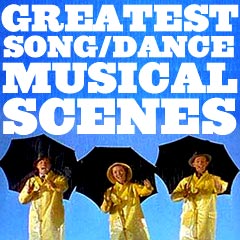
|
|
| R (continued) | |||||||||||
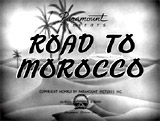
|
Road To Morocco (1942)
This Arabian Nights comedy farce was the third Road film (and probably the best of the lot) with Bob Hope-Bing Crosby-Dorothy Lamour teaming together. The male leads portrayed two castaways after their freighter exploded - Jeff Peters (Bing Crosby) and Orville 'Turkey' Jackson (Bob Hope), who were both interested in romancing Arabian Princess Shalmar (Dorothy Lamour) in her Arabian palace. It included:
|
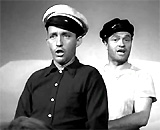 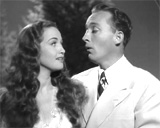 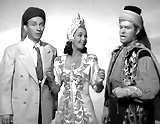
|
|||||||||
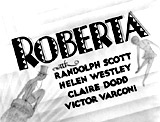
|
Roberta (1935) This film was the third teaming of Astaire and Rogers in the least familiar film of the dance series. The two stars took supporting roles:
In this Broadway adaptation, they danced briefly in a reprise of Jerome Kern's Smoke Gets in Your Eyes (pictured) (also sung by co-star Irene Dunne) - their first formal dance (with graceful backward dips by Rogers). They also performed the role-reversed song I Won't Dance (pictured), (written specifically for the film and sung by Astaire and Rogers) in which a gold-lamé-gowned Rogers was the one to coax Astaire into a tap dancing solo. Rogers also performed at the Cafe Russe, singing -- I'll Be Hard to Handle (pictured). |
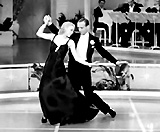 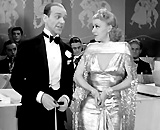 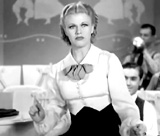
|
|||||||||
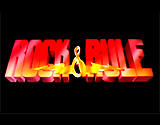
|
Rock & Rule (1983, Canada) There were many catchy rock tunes in this post-apocalyptic Rock & Roll animated fantasy. It was heavily populated by anthropomorphic dogs, cats and mice. The film was noted for its performances by Iggy Pop, Cheap Trick, Debbie Harry, and Earth, Wind and Fire. The best tunes included:
|
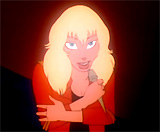 "Angel's Song" 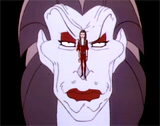 "My Name is Mok" 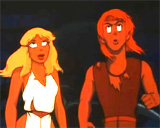
"Send Love Through" |
|||||||||
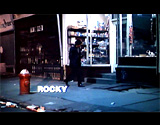 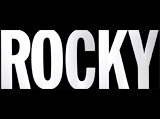
|
John G. Avildsen's Best Picture-winning boxing classic told about a Philadelphia bum and underdog boxer named Rocky Balboa (Sylvester Stallone) who overcame all odds to engage in an exciting 15-round world heavyweight boxing fight finale. This original Rocky film was the most accessible, popular and identifiable of the lot of Rocky films, and it packed movie houses. With ten Academy Awards Oscar nominations and three wins:
In the most memorable, beautifully-edited sequence of the film, a montage accompanied by the rousing song Gonna Fly Now (music by Bill Conti, lyrics by Carol Connors and Ayn Robbins) (pictured many times), Rocky illustrated how he had progressed in his grueling training and workouts in preparation for his Bicentennial fight against Apollo Creed (Carl Weathers); at dawn, he:
He turned and faced the panorama of the city, with his hands triumphantly raised in the air. Although his first run up the endless steps was overwhelmingly difficult, this run was effortless. |
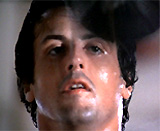 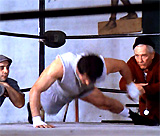 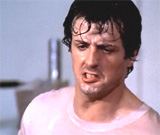 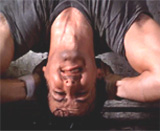 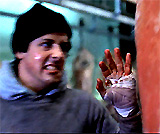 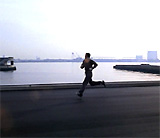
|
|||||||||
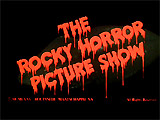
|
The Rocky Horror Picture Show
(1975, UK/US) There were many wild, energetic song-and-dance numbers in this notorious midnight movie audience participation cult film which spoofed sci-fi and horror B-movies. Songs included:
|
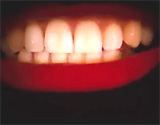 "Science Fiction/Double Feature" 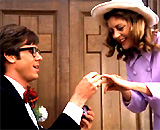 "Dammit Janet" 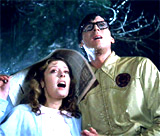 "(There's a Light) Over at the Frankenstein Place" 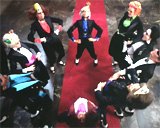 "Time Warp" 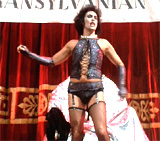 "Sweet Transvestite" 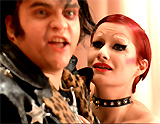 "Hot Patootie Bless My Soul" 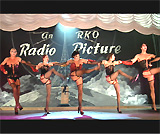 "Wild and Untamed Thing" |
|||||||||
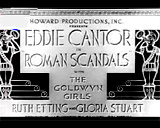
|
Roman Scandals (1933) This elaborate, escapist Samuel Goldwyn musical production (the last film Berkeley directed for the studio before his incredibly-successful run with Warner Brothers) was one of the racier pre-Code movie musicals. It featured notable Harry Warren/Al Dubin songs sung by Eddie Cantor, in a fantasy daydream in ancient Imperial Rome. It wove together several risque Busby Berkeley choreographed numbers into the fantasy. The best of the lot were:
|
  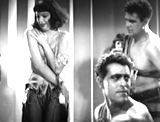 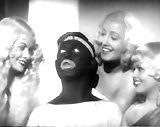 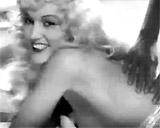 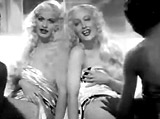
|
|||||||||

|
The Rose (1979)
Bette Midler (in her film studio feature debut in a star-making role) gave a powerfully-electric Oscar-nominated performance as Mary Rose "The Rose" Foster - a bisexual, drug-abusing, alcoholic Janis Joplin-like rock-n-roll singer in the late 1960s, in this downbeat musical melodrama . The ill-fated, self-destructive singer delivered a sweet, melancholic performance of The Rose (pictured), as well as other performances of show-stopping, rousing defiantly-sung numbers in extensive concert sequences:
The film ended during a performance in Jacksonville, Florida. Her two climactic numbers were:
She sang the two songs before tragically collapsing and dying on stage of exhaustion and a fatal drug overdose. |
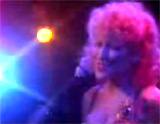 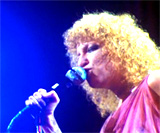 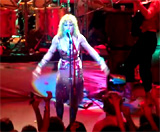 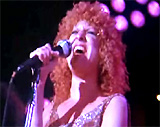
|
|||||||||
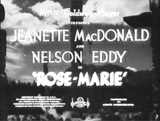
|
Rose-Marie (1936) Director W.S. Van Dyke's dramatic, black/white musical romance was the second screen version of the popular operetta, and the second screen partnering of Jeanette MacDonald with Nelson Eddy (in their best-known film of eight films, stretching from 1935 to 1942). The three main characters in the MGM film were:
The best-remembered duet of a heartfelt love song was Indian Love Call (pictured twice): ("When I'm calling you-Oo-Oo-Oo"), their signature song - performed multiple times in the film.
Earlier in the film, Sgt. Bruce also sang the title song Rose-Marie (pictured) (composed by Oscar Hammerstein II, Otto A. Harbach and Rudolf Frimi) to her during a moonlit canoe paddling on the lake. Afterwards she complimented him: "You have a lovely voice." He admitted: "Every word came right from my heart." But then together, they joked about changing the female's name in the song from Caroline to Genevieve or Annabelle: "What do you do? Change the name to suit the girl?" |
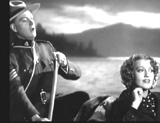 "Rose-Marie" 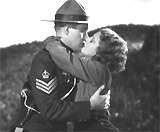 Their First Kiss (After Singing "Indian Love Call" Together) 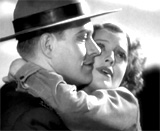 More Hugs |
|||||||||
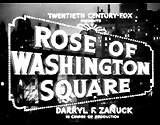
|
Rose of Washington Square (1939) This Fox Studios biopic film, loosely fictionalized and based on the difficult marriage between entertainer Fanny Brice and Nick Arnstein, headlined contralto singing star Alice Faye as musical singing star Rose Sargent. [Note: It was Faye's third and final film pairing with Tyrone Power.] She sang the torch song My Man for her straying crook/con-man husband Barton Dewitt Clinton (Tyrone Power). And she performed the title song, another of Brice's signature tunes, the big production number Rose of Washington Square (pictured twice), accompanied by lots of dancers on a "city street" set doing a 'cigarette dance' with disappearing (and magically-reappearing) cigarettes. One of the film's other major attractions was Al Jolson (as Ted Cotter) reprising his hit standards (in blackface), including:
The most famous song of the film, however, was one that was deleted before the film's release: Al Jolson's rendition of April Showers. |
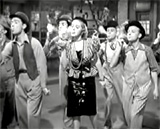 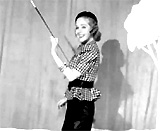 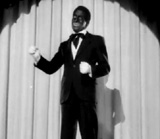 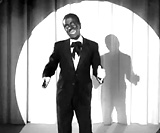
|
|||||||||
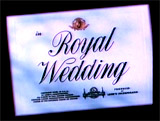
|
Royal Wedding (1951) (aka Wedding
Bells (UK)) Director Stanley Donen's romantic musical (in his first solo directorial assignment and his second film) was loosely based on Fred Astaire's early dance career with his own sister Adele (for almost three decades, beginning in the early 1900s). Fred Astaire and Jane Powell (as Tom and Ellen Bowen) were a famed sister/brother dance/song team and act - on Broadway (in a smash hit revue show titled Every Nite at Seven at the 49th St. Theatre). Overall, the musical featured some of the most creative dance acts in film history. The Broadway musical production's opening number was: "Every Nite at Seven" (pictured) - a "play within a play" by the film's two main characters: Tom Bowen (Fred Astaire) portraying a king and his sister Ellen Bowen (Jane Powell) as his pretty maid. After the closing of their long-running NYC show, the decision of their agent Irving Klinger and his brother Edgar (both Keenan Wynn) in London to book them overseas. Tom and Ellen were to take their show to London's Mayfair Theatre, to cash in on a 'Royal Wedding" - the marriage of Princess Elizabeth II to Prince Philip Mountbatten, the Duke of Edinburgh, in 1947 (an actual historical event that occurred on Nov. 20, 1947). They were booked on-board a French, Trans-Atlantic ship to London. Both would find romance during their sojourn. Ellen was the first to fall in love on board the ship, with secretly-poor English aristocrat Lord John Brindale (Peter Lawford) - a known 'skirt-chaser' and socially-connected gentleman; distracted, she missed a rehearsal session with Tom. In an incredible and inventive practice dance number titled "Sunday Jumps" (pictured) (a hat and coat stand-rack routine), Tom danced solo to a metronome beat with a clothes-horse (or hatstand-rack) and gym equipment in the ship's workout room. Inserted into the dance was a body-building segment, using wall-mounted weights, parallel bars, a pummel horse, and a suspended boxing bag, to mock and parody his muscle-bound dancing rival/friend Gene Kelly. During the song-dance number "Open Your Eyes" (pictured) set in the ship's ballroom, rough weather caused the two dancers (Ellen in a lilac-colored dress with a red sash) to slip and slide on the dance floor. In another sequence, Tom discovered romance with dancer Anne Ashmond (actress Sarah Churchill, Winston's daughter!, in her American film debut), on a London street. She was the daughter of Cockney, American-hating pub landlord James Ashmond (Albert Sharpe). She claimed she had already been engaged a long time earlier to Chicago area-dwelling American Hal Rayton. (At the conclusion of the film, her long-standing engagement was broken when it was discovered that Hal had married a few months ago. She responded with surprise: "How wonderful, how simply wonderful"). On opening night in London, Tom and Ellen performed a comic, vaudeville-like, slightly vulgar song-dance (with Brooklyn-accents) to the impossibly-titled "How Could You Believe Me When I Said I Love You When You Know I've Been A Liar All My Life" (pictured) - [Note: it was noted to be the longest title of any song in an MGM musical]. The amazing, most spectacular song and dance scene ever created (a "wall and ceiling walk") occurred after Tom was lovestruck by Anne. He sang to her photograph, and then solo tap-danced energetically in the number "You're All The World To Me" on the walls and ceiling of his London hotel room. [Note: the set was devised as a rotating cube that rotated at the same speed as the strapped-down camera.]
There was also the sultry performance of the two dancers wearing colorful costumes (Tom was clad in a yellow suit and tie with pink shirt, and Ellen in a bright blue outfit with green waist-sash and headdress) in a lavish Latin American or Caribbean production number to the tune of "I Left My Hat in Haiti" (pictured). By film's end, Tom and Ellen had resolved to not marry their respective partners (and stay together as a team-act - Ellen: "How can you even consider breaking it up? And breaking it up for what? To get married"; Tom was coerced to agree: "It's you and me, just like it's always been"), but then while viewing the jubilation of the royal wedding parade, they changed their minds. Bursting with excitement, they told Edgar: "We want to get married" - and he replied: "I thought you two were related!" After pulling strings to hastily get a marriage license, the film concluded with the aftermath of a double-marriage ceremony that afternoon at 4 pm at the Clyde Street Church between Tom and Anne, and Ellen with Lord Brindale - the two couples emerged from the church, where Tom quipped: "They didn't have to go to all this trouble. A small wedding would've been all right." |
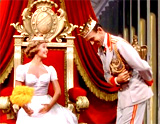 "Every Nite at Seven" - Broadway Show 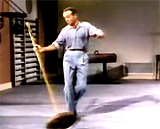 "Sunday Jumps" - in Ship's Weight Room 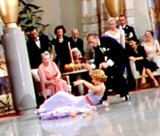 "Open Your Eyes" - On-Board Ship During Rough Weather 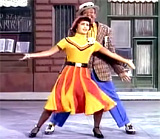 Opening Night in London: "How Could You Believe Me..." 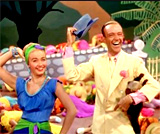 "I Left My Hat in Haiti" 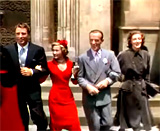 The Two Wed Couples |
|||||||||
(alphabetical by film title) Introduction | A-1 | A-2 | B-1 | B-2 | B-3 | C-1 | C-2 | D-1 | D-2 | E | F-1 | F-2 | G-1 | G-2 H-1 | H-2 | I-J | K | L-1 | L-2 | M-1 | M-2 | N-O | P-1 | P-2 | R-1 | R-2 | S-1 | S-2 | S-3 | T | U-V | W | X-Z |